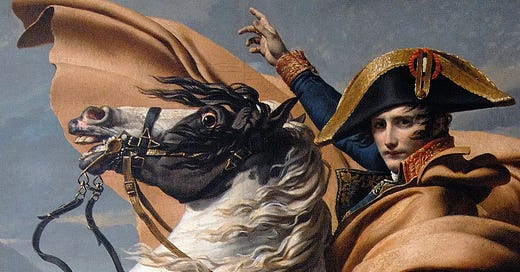Findings: Great Man Theory?
Plus -- Amphibians in Appalachia, riding the trains, YIMBYs, elevators, letter-writing, homeschooling, and breaking philosophy out
Sharing what I’ve been reading, a few deeper pieces this week.
Anthropocene
Not too much inspired me this week on Anthropocene topics. This is hopeful:
Findings
Here are some other long reads I found myself drawn to.
I am of the very strong opinion that travel (foreign or domestic) is an essential part of lifelong learning, which is essential for being a good human in the Anthropocene. I pretty quickly left behind the notion of running a normie-style travel business, because to make it successful meant promoting and selling travel that 1) isn’t the way I like to travel; 2) isn’t particularly educational; 3) isn’t sustainable or responsible; and 4) is focused mainly on serving the wealthy, or on those who will spend lots of money (perhaps irresponsibly) on travel (such as for destination weddings). I couldn’t, in good conscience, be part of the industry as it is — despite the fact that there are some few companies really trying to change things.
The travels of
are so much closer to the real thing.Urbanism as a movement, like tourism, is faced with entrenched institutional resistance to reform. The NIMBY/YIMBY phenomenon is central.
As always, I recommend attending to your locality. In my case, Taming Complexity routinely features urban issues in Albuquerque and New Mexico. Even if you don’t live in the US Southwest, I still recommend a subscription for the far-reaching investigations and sensible coverage of science and policy.
Last week, I shared a video of Oren Cass being interviewed at UnHerd. He had previously written an essay about elevators — yes, elevators — a topic about which I’ve had some recent relevant experience.
Finally, three more reads on history-humanities-education. The first is a heart-warming and delightful write-up on a sliver of real-life history.
There are not so many homeschooling stories coming out of my alma mater, but here’s one! How to Homeschool Eight Kids with a Great Books Curriculum. It’s pretty hilarious, and I can relate. There are indeed many adventures and challenges. Kids are utterly unique beings, each one. We homeschooled four; I can’t imagine eight.
On the other hand, toddlers and three-year-olds are super screechy. If you wear lawnmower-guy headphones around the house, you can still have conversations, but it takes that high-pitched screech out. I became a much better mother when I started wearing headphones.
Yes, it starts with (minimal) discipline and finding ways to cope and tolerate the hot mess. But it’s amazing what you can accomplish once you settle in on basic routines and priorities.
Finally here is: On Breaking Philosophy Out of the Seminar and Back into the World
‘Why did you decide to study philosophy?’ asked the Harvard professor, sitting in the park in his cream linen suit.
‘Because I want to find out how to live,’ I said. ‘I want to find out what matters and I want to live my life accordingly.’
He smiled affectionately, leaning forward in his deck chair.
A young philosopher has broken out of analysis paralysis — but to what end? The outcome of the article is frustratingly inconclusive.
Looking for a place to start on your own philosophical quest? Try this resource.
Books
It’s all-Hannah for me right now, working on Arendt’s The Human Condition. HAC’s VRG (Hannah Arendt Center’s Virtual Reading Group) is going to start Between Past and Future, which I might have to join after my current Brooklyn Institute course. Arendt was a big fan of de Tocqueville, so I’ve been lugging around Democracy in America during summer travel. Will I get to it?
Plus I must go back to Tolstoy’s epilogues from War and Peace. I read the novel ages ago during my Summer of the Russian Novel, along with Dostoevsky. The epilogues (there are two) contain Tolstoy’s philosophy of history, written in reaction to the phenomenon of Napoleon and to what Tolstoy’s contemporaries in western Europe were saying about him. Tolstoy opposed the “great man” theory of history, preferring instead a sort of nationalistic (Russian, Slavophile?) earth-blood-culture-people view, epitomized in the “weak general” counting on the masses even in bitter defeat. To my mind, the view is very dark, investing too much glory in suffering — which again is a Russian thing, one I am all-too-familiar with personally, given Orthodox liturgical tradition and theology. I should revisit all this, as my memory is murky. And now I have a new context: Arendt’s view of political action, of appearing in the world, of making one’s individual mark on history, BUT in the company of a diverse group of equals gathered “around the table.”
Oh, and in a more immediate context, N.S. Lyon’s recent post on Trump as “inevitable great man” really set me off.
Feel like sharing your perspective on any of the above? Please do!









